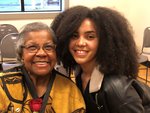

Blacks in Thurston County is a collection of 55 short biographies about Black people who came to Thurston County between 1950-1975. Each chapter is named for the person the stories are about; each chronicles the lives of people who moved to this area. Some of the stories are autobiographical, others written by family members.
The book is the result of a 10-year project led by Dr. Thelma Jackson, who is the executive director of the Northwest Institute for Leadership and Change, which is the book’s publisher. The Introduction, written by Dr. Jackson, tells how the effort began, how it got started, and why it matters.
Many of the people arrived in the 1950s with the “in-migration due to the integration of the military and nearby bases and the opening up of state government due to Affirmative Action efforts,” Jackson explains. This backdrop sets the tone for everything that was happening across the country. While we learn about integration and Affirmative Action initiatives in Seattle and other parts of the country, we are rarely taught about the same things that occurred in Thurston County.
The first chapter is about Melba and Avis Dennis. Avis was the first Black person to receive an advanced degree in engineering from the University of Washington. When the Dennis family wanted to move to Olympia in 1945, their first challenge was to find housing. After being turned away from a number of rental houses, an African American janitor who worked in Hoquiam agreed to rent his vacant and neglected Olympia home to the family.
The story of Melba and Avis answered a question I have wondered about as a Black person who grew up in Olympia; how did this community become and stay predominantly White? Why is it that my family is one of a few Black landowners on the west side of Olympia? It all starts with stories like the Dennis's. Here is Avis, a highly educated Black man trying to make a living for his family who was turned away by White gatekeepers. This is not the only account of housing discrimination in the book, but the redeeming fact of this account is that it took one person to provide housing so that new neighbors could get the chance to begin a life in Thurston County. While racism affected the Dennises in this instance, it did not ultimately stop them.
Racism was (and still is) pervasive in our community. If you don’t agree, read the stories of cross burnings and other racist harassment told in this book or look into what has happened at local high schools recently. But what I appreciated about Blacks in Thurston County was the focus on the many Black contributions that helped build our community as we know it. The fact is that Black people are much more than the trauma we have experienced. This book highlights many Black contributions to the area. While Black people broke barriers in state government and led community efforts, there are also stories of Black people who simply lived their lives. Their kids went to school, they were or were not active in churches and community organizations, they went to work and got married, they made friends with their neighbors. The beauty of this book is that it spans the whole spectrum of Black life, good, bad, beautiful, ugly, human life. Black excellence does not only apply to people who are super involved, forward-facing, successful Black people. Black excellence also lives in those who live their own quiet lives and are successful in their own ways. I think that is incredibly beautiful.
While reading Blacks in Thurston County, I experienced the full gamut of emotions; happy tears, anger, sadness, pride in the contributions of Black people to this community, and excitement about the future.
Growing up, I learned about all of the amazing things that Black icons such as Rosa Parks, Martin Luther King Jr, etc did, but I never felt like I could compare what was happening in the southern United States to local history. That wasn’t because things weren’t happening here, it was because there was no record of it.
What makes Blacks in Thurston County so special are the stories I would not have learned about otherwise that validated my own good and bad experiences as a mixed-race Black woman born and raised in Olympia.
I would like to thank Dr. Thelma Jackson and all other contributors for compiling this community album. It means a lot to me and everyone in this community. I implore each of you to fill the holes in your own knowledge of local history with Blacks in Thurston County, Washington 1950-1975: A Community Album.
The book is available directly from the publisher, the Northwest Institute for Leadership and Change.
Laurel Mack-Wilson is a 2020 graduate of Seattle University and a 2016 graduate of Capital High School. She works as a public relations consultant and events planner for South Sound BIPOC Business Directory at the Thurston County Chamber of Commerce.
Comments
No comments on this item Please log in to comment by clicking here